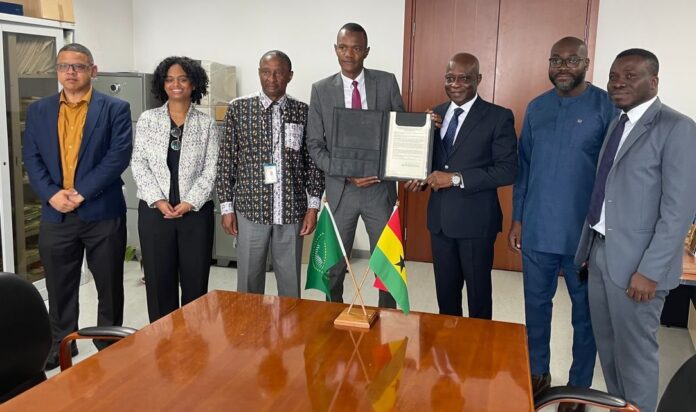Ghana has presented the ratified Instruments of the African Union Convention on Cross-Border Cooperation to the African Union Commission at a ceremony at the African Union Commission Headquarters at Addis Ababa on Monday, September 4.
Ghana signed the agreement to the Convention on 4 July 2017.
The agreement was further ratified by the Parliament of Ghana on 9 February 2023.
Making the presentation on behalf of Ghana at the African Union Commission, the National Coordinator of Ghana Boundary Commission, Major General Emmanuel Kotia, stated during the ceremony that Ghana had now fulfilled its obligation by depositing the Instruments of the ratified Convention signed by the President of the Republic of Ghana on 25 April 2023.
The Instrument was received by the Legal Counsellor of the African Union Commission in the presence of officials of the Ministry of Foreign Affairs and the Ghana Embassy in Ethiopia.
Ghana has thus become the 8th country to ratify the Convention.
Speaking after presenting the Instruments, the Commissioner for Political Affairs, Peace and Security of the African Union Commission, His Excellency Bankole Adeoye, congratulated the Government and People of Ghana for ratifying the African Union Convention on Cross-Border Cooperation.
He further praised the Ghana Boundary Commission for the strides made within the few years of its existence.
He expressed appreciation and excitement at the work of the Ghana Boundary Commission (GhBC) as one of the vibrant Commissions in Africa whose work has been geared towards the preventing of boundary conflicts along the international land and maritime boundaries of Ghana and its neighbours.
The Commissioner revealed that the AU Commission had monitored the progressive work of the Ghana Boundary Commission with the neighbouring Boundary Commissions of Cote d’Ivoire, Togo and Burkina Faso and was impressed with the commitment and enthusiasm of the Commission.
He expressed support to the Ghana Boundary Commission for the proposed upcoming conference on Maritime Boundaries and International Law in Africa as well as using the Ghana Boundary Commission as the lead advocate for the African Union Convention on Cross-Border Cooperation in the Continent.
The Commissioner used the opportunity to thank the President and People of Ghana for the lead role in the safeguarding of Peace, Security and Stability in Africa.
He praised the President of the Republic of Ghana for always supporting the implementation of African Union Protocols and Conventions since he assumed office in 2017.
He further assured the Ghana Boundary Commission that the African Union Commission would support its activities through the African Union Border Programme.
The Ghana Boundary Commission led the process of facilitating the ratification of the Niamey Convention in close collaboration with the Ministry of Foreign Affairs and Regional Integration, the Ministry of Justice, the Office of the Attorney General and other relevant agencies.
The ratification by Ghana was achieved through careful stakeholder meetings organised under the auspices of the Ghana Boundary Commission to ensure broad consultations and inputs prior to the ratification of the Convention by the Parliament of Ghana.
The African Union has over the years promoted cross-border cooperation as part of efforts aimed at achieving an integrated continent where borders would serve as bridges for peace, growth and development.
To this end, the 23rd ordinary session of the African Union held in Malabo, Equatorial Guinea on June 2014, adopted the African Union Convention on Cross-Border Cooperation, known as the “Niamey Convention”.
The Convention is a framework for collaboration across borders which ensures integration in Africa and enhances prospects for peaceful resolution of boundary disputes between Member States.
The aim of the Convention is to promote cross-border cooperation and to ensure peaceful resolution of border disputes.
Till date, 18 out of 55 Member States have signed the Convention with 8 of the States including Ghana ratifying the Convention.
Based on joint activities between neighbouring countries, the Convention would facilitate the development of boundaries and to ease free movements of persons and goods along common borders.
The objectives of the Niamey Convention include;
- The promotion of cross-border cooperation at local, sub-regional and regional levels.
- The facilitation of delimitation, demarcation and reaffirmation of interstate boundaries, in conformity with agreed mechanisms.
- The facilitation of the peaceful resolution of boundary disputes.
- The promotion of peace and stability through conflict prevention and continental integration.
- The transformation of border areas into catalysts for growth, socio-economic and political integration of the continent.
Ghana stands to benefit immensely from the Niamey Convention in various dimensions.
First, the Convention provides a legal framework for the development and implementation of cross-border initiatives. These initiatives will provide mutually beneficial projects, infrastructure and facilities for border communities across Ghana and its neighbours.
The Convention also formalises cooperation between Ghana and other stakeholders as well as institutionalise cross-border cooperation through a continent accepted framework.
Additionally, there are economic implications for the Government of Ghana in ratifying the African Union Convention on Cross-Border Cooperation. This includes economic growth at the borders through employment and development projects in terms of cross-border cooperation and the creation of trade perspectives under the African Continental Free Trade Area (AfCFTA) as well as human security interventions that will contribute to the adoption of cooperation agreements.
The African Union Convention on Cross-Border Cooperation provides the framework and facilitates collaboration with neighbouring states in boundary demarcation, re-affirmation and delimitation of land and maritime boundaries.
In this regard, the African Union Border Programme supported by the GIZ is supporting the Ghana Boundary Commission to undertake the re-affirmation and the replacement of Boundary Pillars for over 400 kilometres of land boundaries with Cote d’Ivoire and Togo between October 2023 and June 2024.


